NEWS
The Home Team: Stephen Curry ’10 on the Improbable Journey That Began at Davidson
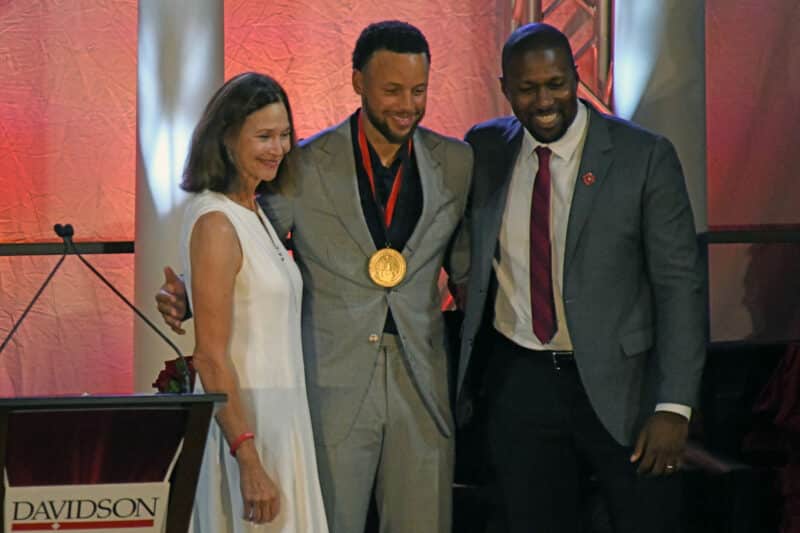
Former Davidson president Carol Quillen and athletic director Chris Clunie presented Steph Curry with the medal representing his induction into the Davidson College athletics Hall of Fame.
There was a moment after the Curry For 3 event—in which Davidson celebrated Stephen Curry’s graduation, Hall of Fame induction and jersey retirement in August—where I was able to steal a few minutes to talk to my friend-turned-four-time-NBA-champion-turned-Davidson alum.
By: David Dennis Jr. ’08
We were on the basketball teams’ practice court for a friends and family reception. Children had been following Stephen around since he walked in and, naturally, he stopped to talk and play with every single one of them. So, I waited until Stephen made his rounds and then he walked over to me. And we said the same thing we say every time we see each other: “Can you believe this journey?”
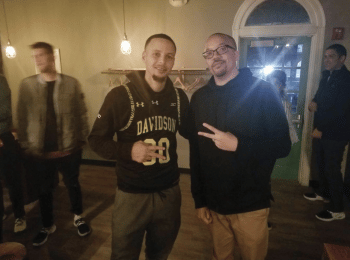
Photo courtesy of David Dennis Jr.
I met Stephen Curry a few days before classes started my junior year, in the fall of 2006. I remember it vividly, not because most people in the world remember the time they met a future NBA Hall of Famer. I remember the moment because it was so awkward: the person—I don’t remember exactly who it was—who introduced Stephen to me told me that he was about to be on the basketball team and that he was good. I nodded, dapped Stephen up and asked him which year he was coming to the school. See, I thought the scrawny kid with a bright smile and clothes that looked a couple of sizes too big was 12, and that I’d be long gone before he got to campus. I felt my face turn beet red when he said he was a freshman. I figured I’d insulted him, but I didn’t know just how used to being underrated he’d already become; and how much he’d grow to relish proving people wrong.
It wouldn’t take long for me to realize how special a basketball player Stephen Curry was, but it would take even less time for us to be friends. We’d spend weekend nights listening to music and freestyle rapping in Stephen’s teammates’—Lamar Hull and Boris Meno—dorm. He’d come to my dorm to help package up CDs for me to sell for my short-lived rap career. It was in these moments that we’d dream about our futures: me wanting to be a journalist, him wanting to be in the NBA. Stephen’s dream had become more real seemingly overnight thanks to a Cinderella 2008 Elite 8, where he wowed America by beating powerhouse teams like Georgetown and Gonzaga as part of a legendary run that, if you’re reading this, you’ve surely committed to memory by now.
As Stephen was making his improbable run, students at Davidson were coming together to speak out against discrimination and push for equity on campus, donning “Do I Make You Uncomfortable?” shirts. Even as his fame was ballooning Stephen was front and center wearing his shirt, making his voice heard alongside his fellow classmates—a move that would help set the tone for the way he’d go on to speak out about global injustices as he became a household name.
I’d graduate two months after that March Madness magic in 2008. A year later, Stephen would enter the NBA draft.
And we’d keep in touch. I’d see him at Warriors games in New Orleans while struggling to make a living as a freelance journalist. Stephen’s team was a laughingstock in the league as questions about the kid from Davidson’s ankles became the dominant narrative of his early career. I’d start covering All-Star games. Stephen would play in them. When he won a championship, I was writing articles about him.
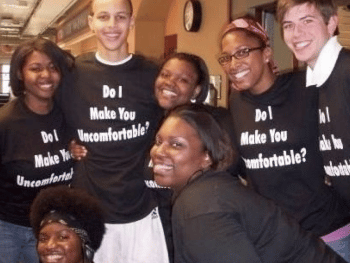
Photo courtesy of David Dennis Jr.
And this summer when my first book came out, Stephen was in the middle of a playoff run that would net him his fourth NBA title and first finals MVP. After each Warriors playoff game, I’d go on TV, scream at the top of my lungs about Davidson and tell the country how proud I was of my friend.
Through it all—the years, the doubts, the joys and sadnesses—we’d text, send messages, encourage each other and celebrate one another. So, when we stood there at the moment that was the culmination of the last 13 years of Stephen’s athletic and academic journey, we could only shake our heads.
“Can you believe this journey?” He’d repeat.
“Nope, not at all,” I’d reply.
A few weeks after the Curry for 3 celebration, Stephen and I were able to catch up and talk about what it means to be a graduate, our college memories and how being at Davidson prepared us to take on an ever-changing world around us.
The conversation between David Dennis Jr. (DD) and Stephen Curry (SC) has been edited for clarity and brevity.
DD: You had your graduation some weeks ago. Have you had a chance to process the moment and everything that happened?
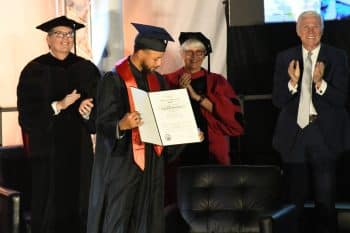 SC: It was like a class reunion and homecoming built into one. I’ve been able to process a little bit, still it was overwhelming to have the one-man graduation. I appreciate the fact that there was a nice balance of honoring the accomplishment but also what it meant to celebrate what we accomplished on the court and the uniqueness of Davidson, and what it means to be a Wildcat. It was a dream come true, for sure.
SC: It was like a class reunion and homecoming built into one. I’ve been able to process a little bit, still it was overwhelming to have the one-man graduation. I appreciate the fact that there was a nice balance of honoring the accomplishment but also what it meant to celebrate what we accomplished on the court and the uniqueness of Davidson, and what it means to be a Wildcat. It was a dream come true, for sure.
DD: By the way, I just want to let you know that the current freshmen were two years old when you were a freshman at Davidson. I just wanted to make you feel as old as I do.
SC: Wow! You just changed my whole perspective on everything.
DD: I was sitting in front of these students at the ceremony and they were awestruck, asking each other if they’d met you. That was so interesting to me because when you were on campus, nobody was starstruck by you.
SC: We had such a “normal” experience of being a student first and an athlete second. There was a slow, slow drip of the basketball teams doing something special before the national interest in what we were doing came along. So, we never got too ahead of ourselves.
DD: Exactly. You were just Stephen the whole time I was there.
SC: Right. The story I go back to is the time I was in your dorm and the doors open, and we’d just lost to UNC and one of the kids walked by the door and looked at me so dramatic and goes, “Heartbreaking,” and he just stood there. (Laughs) It was like it was normal, and that it wasn’t too much hype around us.
Lemme ask you this: what was it like for you to watch the humble beginnings all the way to where we are now?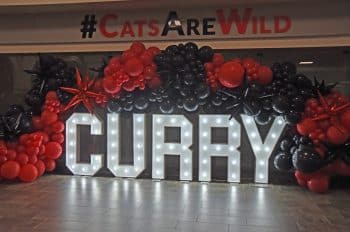
DD: People rewrite that history of you as if you were predetermined to go to the NBA. But you were still a fringe NBA prospect even after the tournament, so it was just like, “Cool, one of my friends is on ESPN.” But that was sort of it.
I do remember once we were at the library studying and you were on Facebook, and where it said “friend requests” it was just an infinity sign. (Laughs)
SC: Oh, yeah! (Laughs)
DD: It was just cool to see someone from Davidson doing something great. You are still as down to earth as everyone says. How did that normalcy you experienced at Davidson shape you?
SC: It’s allowed me to establish a grounding and a perspective, because I never drank my own Kool-Aid. I never got too ahead of myself in terms of journey.
There was always an acknowledgment of the value everybody brought to the table to help me be successful. I know for a fact I’m not playing without every single person I got to rock with on the floor, so I carried that to the league. But you know, those lessons of how you build success and being in the moment came from Davidson.
DD: I remember we hung out in Houston for All-Star weekend in 2013 and it was the last All-Star team you weren’t voted to be on. And you were able to walk to the game and only get stopped a couple of times for autographs. I can’t imagine that happens anywhere anymore. Where do you go to feel that normalcy you felt at Davidson again?
SC: Honestly, it’s home. First and foremost, I have my three kids, who are 10, seven, and four now, but this is a safe haven. Me being a dad and a husband, and you know, fulfilling those roles to the best of my ability.
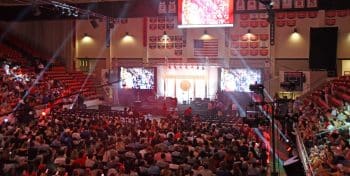 But it’s different. There are a lot of sacrifices. I never thought I’d be in the position that I am right now where those normal spaces are kind of hard to find—just having to call my security to be able to go to dinner in San Francisco. So yeah, things have changed, but I know where I came from. That’s why that graduation ceremony was so special to me—because it’s the grounding effect, and the foundation of what makes me who I am today.
But it’s different. There are a lot of sacrifices. I never thought I’d be in the position that I am right now where those normal spaces are kind of hard to find—just having to call my security to be able to go to dinner in San Francisco. So yeah, things have changed, but I know where I came from. That’s why that graduation ceremony was so special to me—because it’s the grounding effect, and the foundation of what makes me who I am today.
DD: I want to talk a little bit about community building. That’s something that’s embedded in my family, and it’s important to me with social justice work. I look at the way you’ve built community in Oakland in the Bay area, like when you first got drafted, I was like, “Man that’s so far from home. How is he going to make it?”
SC: To be honest, I didn’t even know where Golden State played (laughs). I had no clue.
DD: What does that mean to you, to build community?
SC: First, it’s discovering my new environment. Then it’s a lot of trial and error in terms of finding things that I was passionate about outside of basketball. And then connecting with the right people and community leaders that could help influence and educate me on certain issues.
And now Ayesha and I have the Eat. Learn. Play. Foundation that’s doing a lot of amazing work, humbly speaking. I think a lot of it is being able to walk into a room and be human. I have a genuine curiosity about people, and where they come from, and try to ask the right questions. I try to be approachable, and I think that resonates with a lot of people.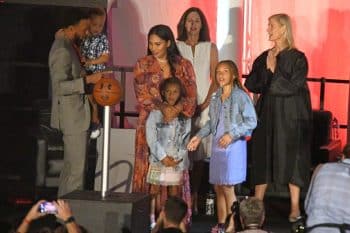
DD: When I got to Davidson it was really my first time around a lot of white folks. Being there was one of my first times learning about Movement work and how to fight. I love Davidson, obviously, but it was not perfect. You’re doing this on a large scale. What is your process, from seeing this thing that is wrong and figuring out how to make a difference?
SC: First and foremost, there’s an influence from you and Clint Smith (’10) and that circle. You all took advantage of those moments where you could speak up to really galvanize around a pivotal issue that needed to be addressed and highlighted, even down to the “Do I Make You Uncomfortable” t-shirts, and just the way that you know the subtle undertones around campus that we all experienced in some way…making those shirts and having tough conversations, understanding that you might piss some people off in the process, but that what you’re trying to do is for the greater good.
DD: Right, that’s exactly it.
SC: That’s what it’s all about. So just having the boldness to step into those arenas, I learned that from y’all, and that you can kind of take the spirit of what that Movement was.
We’re here to be respectful, but we’re here to change things and have those tough conversations. I try to carry that through some of the spaces where I’ve shown up since I’ve left. Whether it’s the Trump issue, and the North Carolina bathroom issue. There’s been a lot of times where I can speak up.
DD: There are a lot of celebrities and athletes who are scared to speak up because they don’t want to speak without learning enough, or they speak before learning and it turns out badly.
How do you continue the learning process—because it doesn’t seem like you’re just flying off the cuff whenever you speak up, and you seem to have a plan.
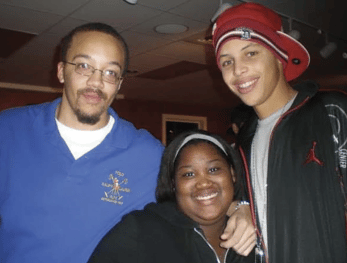
Photo courtesy of David Dennis Jr.
SC: My whole job is to not feel like I’m an expert on anything, but I do have the access to the right people and can amplify their work and their voice to levels that will hopefully move the needle. And again, like you say, one thing that athletes kind of get a bad rap for is when you get asked a question and you actually do have to do homework on that subject. Some people say that’s a cop-out answer. But it’s okay to not talk out the side of your face if you really don’t know, because that could do a lot of damage. It all goes back to being curious, but also being able to admit what you don’t know and try to find the right people that do [know].
DD: So what’s your process of figuring out how to act?
SC: I want to be educated on what I’m talking about. I’m not going to please everybody with what I say. But if you come at it from an aggressive, but respectful, standpoint, you can foster the right conversations that need to happen.
Before Davidson, I really hadn’t had that experience. Like you said, it wasn’t perfect. But it meant a lot to be around great leaders, and the same leaders like y’all, and follow suit.
DD: It was 15 or so years ago we were in the dorms dreaming about all this. And we still have this connection that feels like this uniquely Davidson thing.
SC: It all comes from humble beginnings. We all chose Davidson for a reason and there is such a unique vibe there where we could really explore and find ourselves. I wouldn’t change anything about this journey.
David Dennis Jr. ’08 is the author of The Movement Made Us and the recipient of the 2021 American Mosaic Journalism Prize.


